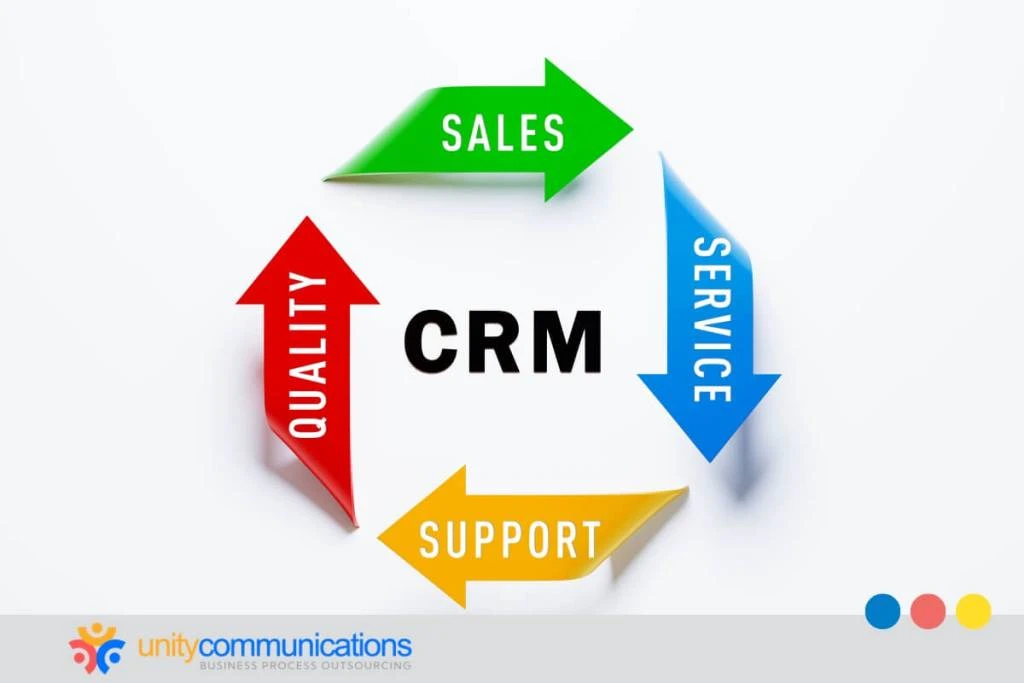Table of Contents
Consumers keep businesses afloat. Companies thus constantly explore innovative ways to meet their changing needs and preferences. But what if routine work hinders your brand from maintaining smooth customer interactions?
Business process outsourcing (BPO) providers offer a cost-effective solution for this roadblock. They employ well-trained workers and robust technologies to help ensure customer satisfaction and retention.
But what exactly is the impact of BPO on customer relationship management (CRM)? Continue reading to learn the answer.
What Is CRM Outsourcing?

CRM outsourcing involves hiring a service provider to handle processes related to maintaining customer loyalty. This business practice lets you focus on improving your products and services while your BPO partner addresses consumer demands and concerns.
Businesses around the world increasingly adopt outsourcing to ensure CRM success. According to Zion Market Research, the global market value will expand to $32.1 billion in 2030 at a compound annual growth rate (CAGR) of over 5%.
Reducing in-house costs drives the need to outsource the following CRM functions:
- Data management and analysis
- Lead generation and qualification
- Customer support
- Telemarketing and digital marketing
- Sales support
- Market research, analytics, and reporting
- Social media management
- Multilingual support
- CRM platform management
Impact of BPO on CRM Functions

Small, mid-sized, and large enterprises acquire BPO services to meet consumers’ needs without overspending. Third-party vendors give access to skilled professionals and modern solutions through hourly or monthly service packages.
From purchasing to after-sales support, vendors deliver unmatched customer experiences using cost-effective resources.
What is BPO’s impact on CRM? Find the answer below.
Optimize Advanced Technologies
Service vendors use or provide CRM systems for improved customer engagement. CRM software compiles customer profiles, transaction details, and files into a single database. This allows support agents and business executives to easily organize and access information. Implementing a cloud based CRM for small business can significantly enhance customer relationship management by offering scalable and flexible solutions tailored to the unique needs of small enterprises.
CRM tools have three main categories: cloud-based, on-premises, and open-source. Regardless of the type, these systems comprise the following features that allow users to monitor, record, and share critical customer data:
- Artificial intelligence (AI) powers task automation and data analysis technologies.
- Contact center automation enables faster responses to massive customer inquiries.
- Marketing automation speeds up the dissemination of digital ad campaigns.
- Sales force automation accelerates lead tracking and generation.
- Geolocation technology facilitates regional marketing and sales efforts.
- Workflow automation streamlines tedious, repetitive CRM processes.
- Human resource management (HRM) software consolidates employment documents.
- Data analytics tools help develop targeted sales and marketing campaigns.
- Unified project management platforms simplify task management and monitoring.
- System integration allows incorporation with other tools, such as enterprise resource planning (ERP) and omnichannel solutions.
- Cloud solutions enable safe data storage, information sharing, and collaboration online.
Enhance Customer Service, Marketing, and Sales
BPO providers combine workforce skills, advanced technologies, and practical strategies to improve consumer support, marketing, and sales. Your in-house team can prioritize your core projects while the third-party support delivers superior customer experiences in the following ways:
- Prepare scripts to ensure consistent and quick responses to customer inquiries.
- Use omnichannel solutions for seamless communication across multiple channels.
- Deploy chatbots and automation tools for round-the-clock customer support.
- Offer self-service options such as frequently asked questions (FAQs) and forums.
- Collect and compile customer feedback for support improvements.
- Help plan and execute marketing campaigns through social media, email, and website.
- Analyze customer interactions and buying behaviors for more targeted campaigns.
- Segment customers and tailor advertisements to achieve higher engagement rates.
- Develop unique and compelling promotional materials, such as posters and short clips.
- Optimize marketing automation tools to streamline campaign workflows.
- Determine and generate potential leads to improve sales strategies.
- Manage sales pipelines to nurture and move leads through the buying journey.
- Interpret sales data to identify trends, opportunities, and areas for improvement.
- Draft recommendations to guide strategic business decisions and sales techniques.
- Provide after-sales customer service.
- Facilitate upselling and cross-selling activities.
The listed measures also help you customize your products and services based on the latest consumer demands. Specifically, BPO providers give insights into personalizing your support to satisfy and retain loyal customers. After all, 90% of Zendesk’s polled buyers said they purchase more from brands offering customized assistance.
Streamline Data Management and Analytics
Streamlining data management and analytics is another crucial impact of BPO on CRM. Service providers integrate expertise into AI, automation, and CRM systems to boost data handling and sensing. These resources ensure accuracy and prevent the high cost of missing or incorrect information.
Third-party vendors also guide your team in making data-driven decisions to meet customer needs, boost interactions, and enhance overall business performance. Below are the methods providers implement to ensure such benefits.
- Deliver and maintain a centralized CRM database. This repository consolidates customer data for safe and smooth access and management.
- Conduct regular data cleansing activities. This function removes repetitive, outdated, or incorrect entries. It ensures the CRM database remains accurate and up to date.
- Integrate CRM systems with other enterprise tools. These platforms include marketing automation, sales tracking, and data analytics solutions. Providers enable seamless data flows, market analyses, and customer interactions.
- Develop customized dashboards presenting data in an easy-to-understand format. This platform lets your in-house and third-party teams track tasks, outcomes, and customer behaviors.
- Perform regular business performance auditing and reporting. This action informs you regarding customer engagement changes, consumer satisfaction ratings, and other relevant metrics. It lets you identify ways to enhance your operations and optimize the impact of BPO on your CRM.
Boost Scalability and Flexibility
Expect increased scalability and flexibility when outsourcing your CRM processes. Service providers can immediately supply well-trained and highly skilled employees to meet your urgent operational needs.
Third-party workers’ proficiency in AI and BPO solutions allows them to handle repetitive workloads quickly and effectively. They also undergo regular training to familiarize themselves with different accounts, work strategies, and industry trends. Such capabilities assist them in fulfilling your short- or long-term CRM requirements.
Hence, you can hire these professionals whenever you require extra support, especially during peak seasons. BPO companies offer contracts with flexible terms and conditions. These agreements allow you to adjust the service scope, pricing, or duration based on your evolving needs.
Ensure Cost Savings and Investment Returns
Guaranteed cost savings and investment returns are among the critical impacts of BPO on CRM. In Deloitte’s 2022 survey, 57% of executives confirmed that cost reduction primarily drives their need to outsource transactional business processes.
Hiring a BPO provider enables you to cut labor, infrastructure, and office space expenses. Service vendors offer fixed-fee deals, giving you precise and predictable budgeting. If you plan to outsource a short-term project, you can choose the pay-as-you-go model. This framework lets you pay an hourly fee for the services you need.
Providers ensure returns on your investment since they specialize in addressing non-core functions. Their employees are well-trained to meet your operational needs. Emerging technologies, such as AI solutions, help produce high-quality output.
Strengthen Customer Data Security
The impact of BPO on CRM includes strengthening customer data protection. Many transactions now occur remotely. Hence, sensitive customer data is vulnerable to attacks. IBM even reported that 82% of breaches covered cloud-based data.
Service providers thus implement various measures to strengthen customer information security. They help you avoid the high cost of data breach mitigation by executing these cybersecurity strategies and solutions:
- Data encryption. Carry out encryption techniques to safeguard data during and outside of transfers. This approach ensures that unauthorized parties cannot read sensitive information.
- Access control. Authorized personnel are the only ones who can access customer data. Service providers regularly review and update these permission rights.
- Secure network infrastructure. BPO providers invest in and roll out robust measures to secure networks. They optimize firewalls, intrusion detection systems, and antivirus scanning tools to combat cyber threats.
- Data center security. Third-party vendors store data in highly secure hubs with biometric access controls and surveillance systems. They also use the cloud to avoid costly equipment maintenance, safeguarding the platform with strong passwords and multifactor authentication.
- Regular security assessment. Support vendors to perform frequent security audits and vulnerability evaluations. These actions help identify and resolve potential weaknesses in systems and processes immediately.
- Employee training. Providers train their employees in security best practices and privacy regulations. They highlight the importance of protecting customer data and the consequences of information leaks.
- Data segmentation. BPO organizations categorize customer data to ensure that only authorized personnel can access it. This action lessens the risk of data exposure.
- Secure file transfer. Service providers use secure protocols and encryption when transferring and sharing files. This action prevents theft and breaches of customer data.
- Incident response plan. BPO firms have well-structured incident response plans. These enable them to promptly respond and mitigate the impact of breaches and cyberattacks.
- Data retention and destruction. Third-party companies establish and implement data retention and destruction policies. These rules only allow them to use customer data when necessary and destroy it when no longer needed.
- Regular compliance review. Support vendors to undergo regular compliance audits to verify their systems and strategies’ adherence to industry-specific regulations and international standards. Regular audits guarantee that customers’ sensitive data is safe from cyber threats.
- Customer Transparency: BPO companies include data management terms and use cases in service-level agreements (SLAs). They also ensure transparent communication regarding data security measures and compliance efforts.
The Future Impact of BPO on CRM

As technology and customer behavior change, BPO providers seek innovative ways to keep up and meet your growing CRM needs. Constant innovations help improve the impact of BPO on CRM.
Before signing a deal with a vendor, you must understand the latest CRM and BPO trends. By doing so, you will know how to ensure investment returns and long-term benefits. Here are some recent trends in this domain:
- Emphasis on retaining customers. With the increasing costs of acquiring new buyers, BPO companies prioritize customer retention strategies. Entrusting your CRM to a provider speeds up customer behavior tracking and issue identification. The collected insights guide you in developing cost-effective methods to maintain loyal buyers.
- Implementation of chatbots. Contact centers continue to use chatbots to automate and speed up responses to massive customer inquiries. This tech enables the delivery of 24/7 support, especially during peak seasons. It also lets human agents focus on more complex issues, increasing productivity and reducing costs.
- Expansion of mobile CRM. As more enterprises shift their focus to a mobile-first approach, the significance and application of mobile CRM in outsourcing also expand. BPO companies increasingly use this platform to meet customer expectations faster and more efficiently, even if agents are away from their desks.
- Use of social media. Based on Emplifi’s statistics, social media ranks first among consumers’ preferred communication channels. Thus, BPO companies continue to enhance their social media support services. They integrate this platform into their omnichannel solutions for more seamless customer interactions.
- Deployment of voice-enabled CRM. Smart speakers and voice assistants are gaining wider acceptance nowadays. Hence, the use of voice-enabled CRM systems will also grow. Providers leverage these platforms to let customers engage with them through voice instructions, improving the experience for buyers who prefer to avoid written communication.
- Integration of augmented reality (AR) and virtual reality (VR) with CRM. BPO companies explore using AR and VR technologies to provide immersive customer experiences. For instance, you can hire a provider to use AR/VR to make a 3D visualization of your furniture products.
The Bottom Line
Outsourcing is a viable strategy for businesses looking for cost-efficient CRM support processes. The impact of BPO on CRM ranges from leveraging modern technologies to safeguarding sensitive customer information.
Knowing the latest trends in CRM outsourcing is crucial as customer demands constantly increase and technologies continuously evolve. The resulting insights inform your efforts to improve your products and services, ensuring customer satisfaction and retention.
Let’s connect if you want to work with a contractor to streamline time-consuming CRM tasks. Unity Communications deploys advanced solutions and skilled professionals to help build a good relationship with your loyal and potential customers.



